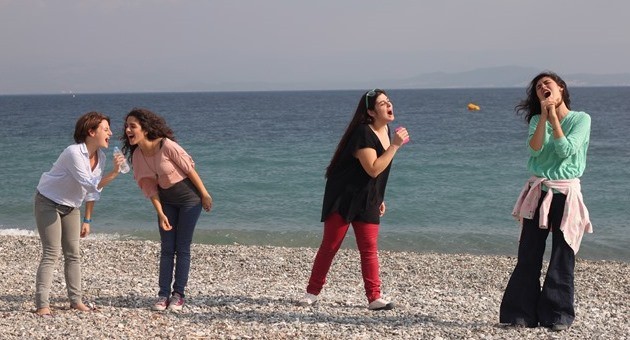Zeynep Dadak was born in Balikesir, the midsize Turkish city where The Blue Wave is set. She has been making movies since 2001, is a contributor to the Turkish film magazine Altyazi, and lectures on film at various universities. She previously collaborated with Merve Kayan on the documentary Bu Sahilde (2010).
Merve Kayan studied film at UC San Diego and has worked on various film projects in Istanbul and New York City as a cinematographer and an editor. The Blue Wave is Dadak and Kayan’s first fiction feature. (Press materials)
The Blue Wave premiered at the San Francisco International Film Festival on April 27.
Please give us your description of the film.
The Blue Wave is an ensemble film — an assembly of
characters, emotions, movements and locations. Deniz is a high school girl
growing up in a small town on the west coast
of Turkey. She and her close friends, Esra and Gul, dream of
leaving this town one day to go to university in a big city. All that stands in
their way is the feared university entrance exam, which they will have to take
in two years. As if the upheavals and troubles of the teenage
years were not enough, a nationwide gas outage brings life to a standstill.
What drew you to this story?
We
wanted to make a film about a group of well-developed female characters that
have their own voice. Young women who can talk and are able to express
themselves. We played around with certain questions. What kind of challenges
does a young girl who grows up in a small city face? What
are the possible ways to tell a story about young women without confining them
to a single, heavy-handed dramatic conflict? As two writer-directors who have
been working together for some time,
we have always been interested in the relationship between places and people.
What was the biggest challenge in making the film?
Aside
from challenges that many first features entail, such as having to be involved
in the production side and still trying to maintain a certain clarity about
directing the film, perhaps the biggest challenge was shooting the film on a
pretty tight schedule. A script with changing seasons and locations with
numerous characters played by actors in various ages and experiences makes for a
dynamic set. It also requires, nevertheless, a lot from the directors to hold
onto what is essential to each scene.
What advice do you have for other female directors?
They
don’t have to become a “man” on set. Filmmaking is not necessarily about
developing a tough skin. And also some women directors tend/are expected to compensate for everything that goes wrong during different stages of production. It’s helpful to be aware of the pressures often put on women in film, the pressure of approval, even the pressure to “take care” of others. We should
remember that there are many people who are ready and able to collaborate with
us. It’s a matter of good timing to bring all the right elements. If it does
not happen for the first film, that’s fine too. Focusing on what one
wants to do is the key to all good films.
What’s the biggest misconception about you and your work?
The
misconception usually ends up being about representation. Especially when you
tell a story about young women and you are women writers/directors yourself, there is always a false impression that your work must be autobiographical
and/or “personal.” And this brings in the basic questions about representation
and reality. A film that feeds from real experiences but tries not to represent
them in a “realistic” way necessarily is difficult to grasp for some viewers.
Do you have any thoughts on what are the biggest challenges and/or
opportunities for the future with the changing distribution mechanisms for
films?
Theatrical
distribution should go through a major reconstruction. There is an urgent need for alternative distribution channels and strategies for independent films. The challenge is to predict and be intimately familiar with the changing scale, resolution, and consumption methods of digital audiences and allow it to affect decisions in production and post-production. On the other hand, all these changes mean new and different exciting outlets for the makers and the viewers.
Name your favorite women-directed film and why.
Vagabond by Agnes Varda. Agnes Varda, who brings together documentary and fiction filmmaking
practices has been an inspiration for us for many years. She has a wonderful sense of humor. Also Jane Campion’s In the Cut and Lucrecia Martel’s La Cienaga are films we often revisit, especially for the atmosphere they have created.







